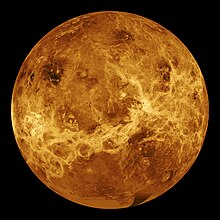Shukra
| Shukra | |
|---|---|
Guru of the Asuras God of Venus | |
| Member of Grahas | |
| Abode | Patala Loka |
| Planet | Venus |
| Mantra |
Om drāṃ drīṃ drauṃ saḥ śukrāya namaḥa
|
| Day | Friday |
| Color | White |
| Number | Six (6) |
| Mount | White Horse |
| Personal information | |
| Parents | |
| Consort | Jayanti, Urjjasvati, and Sataparva[2] |
| Children | Devayani, Arā, Shanda, Tvasthadhar, and Marka[1] |
Shukra (
Hinduism
In
Vamana, the dwarf avatar of Vishnu, requests the asura king Mahabali for three steps of land. Mahabali acceded to the request and as was the practice, took up the kamandalu to pour water to symbolically signify the donation to Vamana. When Shukra, the asuras' guru, had realised Vamana's true identity, he tried to prevent the flow of water from the kamandalu by blocking the spout, Vamana pierced the spout with a stick, blinded Shukra.[5]
Shukra's mother was Kavyamata, whilst Shukra's wives were the goddesses Urjasvati, Jayanti, and Sataparva. Sometimes, Urjjasvati and Jayanti are considered to be one goddess.[6] With her, Shukra produced many children, including Queen Devayani.[7] Sataparva was childless.
In the Mahabharata, Shukracharya is mentioned as one of the mentors of Bhishma, having taught him political science in his youth.[8]
Astrology
In classical Vedic astrology or
It is also popularly propitiated through Devi Aradhana or worshipping the goddess Lakshmi.
Planet
Shukra as a planet appears in various Hindu astronomical texts in
The manuscripts of these texts exist in slightly different versions, present Shukra's motion in the skies, but vary in their data, suggesting that the text were open and revised over their lives.[11][12][13]
The 1st millennium CE Hindu scholars had estimated the time it took for sidereal revolutions of each planet including Shukra, from their astronomical studies, with slightly different results:[14]

| Source | Estimated time per sidereal revolution[14] |
| Surya Siddhanta | 224 days, 16 hours, 45 minutes, 56.2 seconds |
| Siddhanta Shiromani | 224 days, 16 hours, 45 minutes, 1.9 seconds |
| Ptolemy | 224 days, 16 hours, 51 minutes, 56.8 seconds |
| 20th century calculations | 224 days, 16 hours, 49 minutes, 8.0 seconds |
Calendar and zodiac
The weekday Shukravara in Hindu calendar, or Friday, has roots in Shukra (Venus). Shukravara is found in most Indian languages, and Shukra Graha is driven by the planet Venus in Hindu astrology. The word "Friday" in the Greco-Roman and other Indo-European calendars is also based on the planet Venus.
Shukra is a part of the Navagraha in the Hindu zodiac system. The Navagraha developed from early works of astrology over time. Deifying planetary bodies and their astrological significance occurred as early as the Vedic period and was recorded in the Vedas. The classical planets, including Venus, were referenced in the Atharvaveda around 1000 BCE. The planet Venus was deified and referred to as Shukra in various Puranas.
See also
- Varuna
- Ahura Mazda
- Venus (astrology)
- Venus (mythology)
- Navagraha
- Nakshatra
- List of Natchathara temples
- Jyotisha
- Saptarishi
- List of Hindu deities
- Vishnu
References
- ^ "Shukra, Śukrā, Śukra: 39 definitions". 24 June 2012.
- ^ Puranic Encyclopedia: a comprehensive dictionary with special reference to the epic and Puranic literature, Vettam Mani, Motilal Banarsidass, Delhi, 1975, p. 760.
- ISBN 978-1-135-96390-3.
- ^ ISBN 978-0-14-341421-6.
- ^ https://web.archive.org/web/20050207221439/http://www.pichu.info/nav.htm, Suryanar Koil
- ISBN 978-81-208-1273-4.
- ISBN 978-81-208-1273-4.
- ISBN 978-81-7276-405-0.
- ^ ISBN 978-81-208-0612-2.
- OCLC 463213346.
- ISBN 978-81-206-0530-5.
- ISBN 978-81-208-0612-2.
- ^ J Fleet (1911). "Arbhatiya". Journal of the Royal Asiatic Society of Great Britain and Ireland. Cambridge University Press for the Royal Asiatic Society: 794–799.
- ^ ISBN 978-81-208-0612-2.
Further reading
- S2CID 125228353.
- Pingree, David (1981). Jyotihśāstra : Astral and Mathematical Literature. ISBN 978-3447021654.
- Yukio Ohashi (1999). Johannes Andersen (ed.). Highlights of Astronomy, Volume 11B. Springer Science. ISBN 978-0-7923-5556-4.
External links
 Media related to Shukra at Wikimedia Commons
Media related to Shukra at Wikimedia Commons

